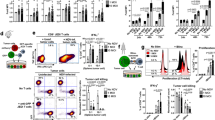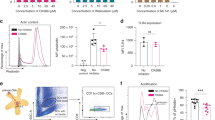Abstract
Immunity to tumors as well as to viral and bacterial pathogens is often mediated by cytotoxic T lymphocytes (CTLs). Thus, the ability to induce a strong cell-mediated immune response is an important requirement of novel immunotherapies. Antigen-presenting cells (APCs), including dendritic cells (DCs), are specialized in initiating T-cell immunity. Harnessing this innate ability of these cells to acquire and present antigens, we sought to improve antigen presentation by targeting antigens directly to DCs in vivo through apoptosis. We engineered Fas-mediated apoptotic death of antigen-bearing cells in vivo by co-expressing the immunogen and Fas in the same cell. We then observed that the death of antigen-bearing cells results in increased antigen acquisition by APCs including DCs. This in vivo strategy led to enhanced antigen-specific CTLs, and the elaboration of T helper-1 (Th1) type cytokines and chemokines. This adjuvant approach has important implications for viral and nonviral delivery strategies for vaccines or gene therapies.
This is a preview of subscription content, access via your institution
Access options
Subscribe to this journal
Receive 12 print issues and online access
$209.00 per year
only $17.42 per issue
Buy this article
- Purchase on Springer Link
- Instant access to full article PDF
Prices may be subject to local taxes which are calculated during checkout







Similar content being viewed by others
References
Janeway, C. The immune system evolved to discriminate infectious nonself from noninfectious self. Immunology Today 13, 11–16 (1992).
Matzinger, P. Tolerance, danger, and the extended family. Ann. Rev. Immunol. 12, 991–1045 (1994).
Gallucci, S., Lolkema, M. & Matzinger, P. Natural adjuvants: endogenous activators of dendritic cells. Nat. Med. 5, 1249–1255 (1999).
Sigal, L.J., Crotty, R., Andino, R. & Rock, K. Cytotoxic T-cell immunity to virus-infected non-haematopoietic cells requires presentation of exogenous antigen. Nature 398, 77–80 (1999).
Albert, M., Sauter, B. & Bhardwaj, N. Dendritic cells acquire antigen from apoptotic cells and induce class I-restricted CTLs. Nature 392, 86–89 (1998).
Mitchell, D., Nair, S. & Gilboa, E. Dendritic cell/macrophage prescursors capture exogenous antigen for MHC class I presentation by dendritic cells. Eur. J. Immunol. 28, 1923–1933 (1998).
Kim, J., Tsai, A., Nottingham, L., Morrison, L. & Cunning, D. Intracellular Adhesion Molecule-1 (ICAM-1) modulates β-chemokines and provides costimulatory signals required for T-cell activation and expansion in vivo. J. Clin. Invest. 103, 869–877 (1999).
Kim, J. et al. CD8 positive T cells influence antigen-specific immune responses through the expression of chemokines. J. Clin. Invest. 102, 1112–1124 (1998).
Kim, J. et al. Engineering of in vivo immune responses to DNA immunization via codelivery of costimulatory molecule genes. Nat. Biotechnol. 15, 641–646 (1997).
Chattergoon, M., Robinson, T., Boyer, J. & Weiner, D. Specific immune induction following DNA-based immunization through in vivo transfection and activation of macrophages. J. Immunol. 160, 5707–5718 (1998).
Agadjanyan, M. et al. CD86 (B7-2) can function to drive MHC-restricted antigen-specific CTL responses in vivo. J. Immunol. 162, 3417–3427 (1999).
Porgador, A. et al. Predominant role for directly transfected dendritic cells in antigen presentation to CD8+ T-cells after gene gun immunization. J. Exp. Med. 188, 1075–1082 (1998).
Coney, L. et al. Facilitated DNA inoculation induces anti-HIV immunity in vivo. Vaccines 12, 1545–1550 (1994).
Takahashi, H. et al. Induction of broadly cross-reactive cytotoxic T–cells recognizing an HIV-1 envelope determinant. Science 255, 333–336 (1992).
Shirai, M., Pendleton, C. & Berzofsky, J. Broad recognition of cytotoxic T-cell epitopes from the HIV-1 envelope protein with multiple class I histocompatibility molecules. J. Immunol. 148, 1657–1667 (1992).
Mogensen, S. & Virelizier, J. The interferon–macrophage alliance [Review]. Inteferon 8, 55–84 (1987).
Seder, R. & Paul, W. Acquisition of lymphokine-producing phenotype by CD4+ T-cells. Ann. Rev. Immunol. 12, 635–673 (1994).
Banchereau, J. & Steinman, R. Dendritic cells and the control of immunity. Nature 392, 245–252 (1998).
Porgador, A., Snyder, D. & Gilboa, E. Induction of antitumor immunity using bone marrow–generated dendritic cells. J. Immunol. 156, 2918–2926 (1996).
Celluzzi, C.M., Mayordomo, J.I., Storkus, W.J., Lotze, M.T. & Falo, L.D.J. Peptide-pulsed dendritic cells induce antigen-specific, CTL-mediated protective tumor immunity. J. Exp. Med. 183, 283–287 (1996).
Mayordomo, J.I. et al. Bone marrow–derived dendritic cells serve as potent adjuvants for peptide-based antitumor vaccines. Stem Cells 15, 94–103. (1997).
Hsu, F.J. et al. Vaccination of patients with B-cell lymphoma using autologous antigen-pulsed dendritic cells. Nat. Med. 52–58 (1996).
Murphy, G., Tjoa, B., Ragde, H., Kenny, G. & Boynton, A. Phase I clinical trial: T-cell therapy for prostate cancer using autologous dendritic cells pulsed with HLA-A0201–specific peptides from prostate-specific membrane antigen. Prostate 29, 371–380 (1996).
Nestle, F.O. et al. Vaccination of melanoma patients with peptide- or tumor lysate–pulsed dendritic cells. Nat. Med. 4, 328–332 (1998).
Nagata, S. & Goldstein, P. The Fas death factor. Science 267, 1449–1456 (1995).
Trauth, B. et al. Monoclonal antibody-mediated tumor regression by induction of apoptosis. Science 245, 301–305 (1989).
Vignaux, F. et al. TCR/CD3 coupling to Fas-based cytotoxicity. J. Exp. Med. 181, 781–786 (1995).
Matzinger, P. An innate sense of danger. Semin. Immunol. 10, 399–415 (1998).
Kim, J.J. et al. Modulation of amplitude and direction of in vivo immune responses by co-administration of cytokine gene expression cassettes with DNA immunogens. Eur. J. Immunol. 28, 1089–1103 (1998).
Kim, J. et al. Molecular and immunological analysis of genetic prostate-specific antigen. Oncogene 17, 3125–3135 (1999).
Acknowledgements
This work was supported in part by grants from the NIH to D.B. Weiner. We wish to thank R. Ciccarelli from Wyeth Lederle Vaccines for thoughtful discussion and providing material for this study. We also wish to thank J. Faust at the Wistar Institute Flow Cytometry Core for expert technical assistance. M. Chattergoon would like to thank A. Moise for thoughtful discussion and support of this work.
Author information
Authors and Affiliations
Corresponding author
Rights and permissions
About this article
Cite this article
Chattergoon, M., Kim, J., Yang, JS. et al. Targeted antigen delivery to antigen–presenting cells including dendritic cells by engineered Fas-mediated apoptosis. Nat Biotechnol 18, 974–979 (2000). https://doi.org/10.1038/79470
Received:
Accepted:
Issue Date:
DOI: https://doi.org/10.1038/79470
This article is cited by
-
Increase in DNA vaccine efficacy by virosome delivery and co‐expression of a cytolytic protein
Clinical & Translational Immunology (2014)
-
Induction of antigen‐positive cell death by the expression of Perforin, but not DTa, from a DNA vaccine enhances the immune response
Immunology & Cell Biology (2014)
-
Novel and enhanced anti-melanoma DNA vaccine targeting the tyrosinase protein inhibits myeloid-derived suppressor cells and tumor growth in a syngeneic prophylactic and therapeutic murine model
Cancer Gene Therapy (2014)
-
Role of innate signalling pathways in the immunogenicity of alphaviral replicon-based vaccines
Virology Journal (2011)
-
Plasmids encoding the mucosal chemokines CCL27 and CCL28 are effective adjuvants in eliciting antigen-specific immunity in vivo
Gene Therapy (2010)



